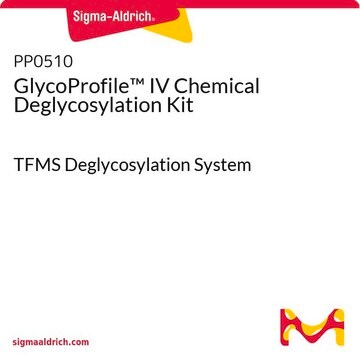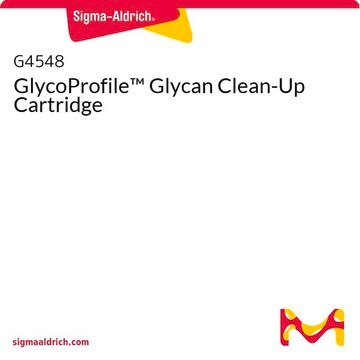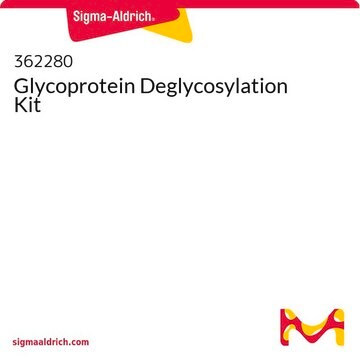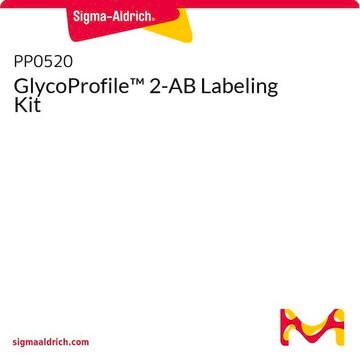Recommended Products
shelf life
≥1 yr at 2‑8 °C
storage temp.
2-8°C
Application
The GlycoProfile™ Enzymatic In-gel N-Deglycosylation Kit is optimized to provide a convenient, reproducible method to N-deglycosylate and digest protein samples from one dimensional (1D) and two dimensional (2D) polyacrylamide gel pieces for subsequent mass spectrometry or HPLC analysis.
This procedure is suitable for Coomassie® Brilliant Blue and colloidal Coomassie stained gels. Silver stained gels may also be used if properly destained.
This procedure is suitable for Coomassie® Brilliant Blue and colloidal Coomassie stained gels. Silver stained gels may also be used if properly destained.
Principle
The kit includes Proteomics Grade PNGase F and trypsin enzymes necessary for N-linked deglycosylation and tryptic digestion, respectively. The samples can then be desalted and concentrated for analysis by MALDI-TOF MS or electrospray MS with subsequent database searching.
Quantity
Each kit contains reagents sufficient to deglycosylate and digest up to 10 samples.
Legal Information
GlycoProfile is a trademark of Sigma-Aldrich Co. LLC
Kit Components Only
Product No.
Description
- Acetonitrile, ≥99.93%, BioSyn® 50 mL
Kit Components Also Available Separately
Product No.
Description
SDS
- P7367PNGase F from Elizabethkingia meningoseptica, BioReagent, ≥95% (SDS-PAGE), for proteomics 50 USDS
- T6567Trypsin from porcine pancreas, Proteomics Grade, BioReagent, Dimethylated 20 μgSDS
- Trypsin Solubilization Reagent
- I0408Invertase Glycoprotein Standard, BioReagent, from Saccharomyces cerevisiae, for proteomicsSDS
Signal Word
Danger
Hazard Statements
Precautionary Statements
Hazard Classifications
Acute Tox. 4 Dermal - Acute Tox. 4 Inhalation - Acute Tox. 4 Oral - Eye Irrit. 2 - Flam. Liq. 2 - Resp. Sens. 1 - Skin Irrit. 2 - STOT SE 3
Target Organs
Respiratory system
Storage Class Code
3 - Flammable liquids
Flash Point(F)
35.6 °F
Flash Point(C)
2.0 °C
Certificates of Analysis (COA)
Search for Certificates of Analysis (COA) by entering the products Lot/Batch Number. Lot and Batch Numbers can be found on a product’s label following the words ‘Lot’ or ‘Batch’.
Already Own This Product?
Find documentation for the products that you have recently purchased in the Document Library.
Customers Also Viewed
Our team of scientists has experience in all areas of research including Life Science, Material Science, Chemical Synthesis, Chromatography, Analytical and many others.
Contact Technical Service











